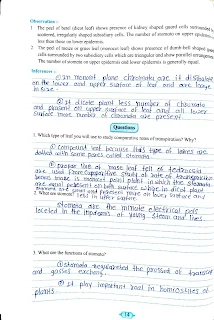Study of structure and distribution of stomata on upper and lower surfaces of the leaf.
Study of structure and distribution of stomata on upper and lower surfaces of the leaf.
In this Blog, we will tell you how to download chapter number 3 study of structure distribution for class 12th biology projects.
and search here think work VM knowledge searching like this
In this way the page will be open your go and this is the first site
You have to search the study of structure and distribution is fine and if you want, you can also download it, then if you liked the Blog, then like the Blog, Follow the channel, see you bye bye till then in the next blog
Practical Notebook Biology Standard XII
Tags:-
- 12th biology textbook pdf
- 12th biology practical book answers pdf
- 12th biology practical book answers pdf 2023
- 12th biology practical book answers pdf download
- 12th biology practical book answers pdf Maharashtra board
- biology class 12 practical syllabus 2023
- experiment no 3 biology practical answers pdf 12th
- biology 12th practical book solutions pdf 2023
- biology 12th practical book,12th biology practical book project
- 12th biology practical in Hindi, Practical 12th biology
- biology practical class 12 part A
- biology practical class 12 part b experiment 2
- 12th biology practical book project
- 12th biology practical part b
- 12th biology handbook
- 12th class practical Study of plasmolysis in epidermal peels Download in Pdf
- biology practical class 12 Study of plasmolysis in epidermal peels
- a. experiments to be performed 2 biologies practical class 12
- biology practical experiment 2
- biology practical answers class 12
- biology practical book class 12 answers
All Practical Biology A. EXPERIMENTS TO BE PERFORMED
Study of osmosis system by potato osmoscopePractical in pdf:- Download
Study of plasmolysis in epidermal peels Answers Download for pdf:- Download
Study of structure and distribution of stomata on upper and lower surfaces of the leaf. :- Download
Study of pollen germination on slide._1 Practical in PDF:- Download
Study of soil sample at least from two different sites with respect to there texture and PH and correlate plants found theref._1 :- Download
Study of suspended particulate matter in the air at the two widely different sites, in your area:- Download
Study of water samples collected from different water bodies for their pH, clarity, and presence of living organisms (microscopic/ planktonic). :- Download
Study of population density and frequency of different plant populations, by quadrat method.:- Download
Isolation of DNA from a given sample:- Download
Dissect and display floral whorls. Dissect another and take T.S. or V.S. of the ovary to show pollen grains and locules of the ovary, respectively.:- Download
To study wing shape and eye color in Drosophila.:- Download
To examine the presence or absence of Barr body in the given sample.:- Download
Detection of commonly used adulterants in milk.:- Download
To detect the presence of starch, added as an adulterant to the milk.:- Download
To study various syndromes and their karyotypes in human beings.:- Download
All Practical Biology B. EXPERIMENTS TO BE PERFORMED
Download
Chapter 3
Stomata are the minute, elliptical pores present on the epidermis of the young stem, leaves, and fruit wall.
Aim To study structure and distribution of stomata in the upper and lower epidermis of a leaf
Requirements
Fresh leaf of Betel (dicot plant) and grass or more (monocot leaf), glass slides, cover slips, watch glass, blades, glycerine, etc.
The principle Loss of excess water in the form of vapor from aerial parts of the plant body is known as transpiration. The main plant organ involved is the leaf and it carries out this process with stomata present on both of its epidermal layers. The dicot leaf shows a difference in the number of stomata on its upper and lower epidermal surfaces whereas the monocot leaf shows an equal number of stomata on both surfaces.
Procedure:
- Take a betel leaf and maize or a grass leaf, fold these leaves and peel off them on both surfaces.
- Using a blade, cut the peel on both surfaces of the leaf.
- Mount these peels on the slide, add a drop of glycerine over it, and put a cover slip. Pollen grains are the male reproductive units produced in the anther lobe of statement-producing pollen tubes carrying male gametes, on germination. Aim: To study the process of pollen germination on the slide while observing under the compound microscope. Requirements - Flower of Catharanthus (periwinkle) Helianthus (Sunflower) or Hibiscus (shoe flower), cavity slide/glass slide, coverslips, compound microscope, sucrose crystals (Table sugar), etc. Principle:
- Study of pollen germination on the slide. Pollen grain after being deposited over the stigma absorbs water and nutrients from the stigma and germinates to produce male gametophytes showing pollen tube with two non-motile male gametes and a larger vegetative nucleus
Figure: observe some Fig Procedure:
- A nutrient medium is to be prepared using 20grams of sucrose in 100 ml of water.
- Take a few drops of this solution preferably on a cavity slide and dust a few pollen grains from mature, dehisced anther.
- Place the coverslip carefully.
- Observe the slide under the compound microscope for minutes. Observation
- In the nutrient medium, the pollen will germinate and the pollen tube comes out through the germ pore. It is due to the enlargement of the tube cell and stretching of the intine, the pollen tube comes out and grows.
- Inferences: different stages are gametic pollens. pollens are in their initial Stage,









Comments
Post a Comment
Thank you to visit My blog